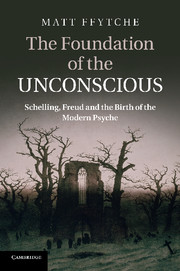Book contents
- Frontmatter
- Contents
- Acknowledgements
- Introduction: the historiography of the unconscious
- Part I The subject before the unconscious
- 1 A general science of the I: Fichte and the crisis of self-identification
- 2 Natural autonomy: Schelling and the divisions of freedom
- Part II The Romantic unconscious
- Part III The psychoanalytic unconscious
- Bibliography
- Index
1 - A general science of the I: Fichte and the crisis of self-identification
Published online by Cambridge University Press: 05 December 2011
- Frontmatter
- Contents
- Acknowledgements
- Introduction: the historiography of the unconscious
- Part I The subject before the unconscious
- 1 A general science of the I: Fichte and the crisis of self-identification
- 2 Natural autonomy: Schelling and the divisions of freedom
- Part II The Romantic unconscious
- Part III The psychoanalytic unconscious
- Bibliography
- Index
Summary
‘Gentlemen’ he would say, ‘collect your thoughts and enter into yourselves. We are not at all concerned now with anything external, but only with ourselves.’ And, just as he requested, his listeners really seemed to be concentrating upon themselves. Some of them shifted their position and sat up straight, while others slumped with downcast eyes. But it was obvious that they were all waiting with great suspense for what was supposed to come next. Then Fichte would continue: ‘Gentlemen, think about the wall.’ And as I saw, they really did think about the wall, and everyone seemed able to do so with success. ‘Have you thought about the wall?’ Fichte would ask. ‘Now, gentlemen, think about whoever it was that thought about the wall.’ The obvious confusion and embarrassment provoked by this request was extraordinary. In fact, many of the listeners seemed quite unable to discover anywhere whoever it was that had thought about the wall. I now understood how young men who had stumbled in such a memorable manner over their first attempt at speculation might have fallen into a very dangerous frame of mind as a result of their further efforts in this direction.
The question now is whether a freedom such as I wish is even thinkable.
There is a certain appeal in beginning this investigation into the languages of modern subjectivity, individuality and the unconscious, with the German radical idealist philosopher Fichte. Though the grounds of most of Fichte’s ideas – the problems he wrestled with and developed – lie, as for many Germans of his generation, in the terrain opened up by Kant’s new critical philosophy, it was Fichte who sought to pull the various elements of the Kantian system into shape around a theory of the ‘I’ (Ich). Kant had famously left his system divided between very well-defined, but ultimately separate component investigations into how the self knows, how it acts morally and what the conditions of judgement are, and had sought, for reasons I will discuss below, to fend off any ultimate attempt to delineate the nature or coherence of the human subject as a whole. Following the lead of Karl Leonhard Reinhold, the most important early interpreter and populariser of Kant’s critical philosophy, Fichte sought very explicitly to close the gaps in the system, and to give a full moral and intellectual account of the foundations of selves. Not only this, but he translated Kant’s concern with the technical constitution of knowledge, of the knowing subject, into a much grander theory of the ‘I’ and the production of its freedom and self-determination.
For this reason, various contemporary Fichte commentators have wanted to claim for his work a foundational status in relation to modern conceptions of the self. Most conspicuously, for Dieter Henrich, ‘anyone seeking a suitable concept of “self-consciousness” must go back to Fichte’; for Neuhouser, Fichte’s goal was to develop an account of the nature of subjecthood; and La Vopa finds Fichte’s modern relevance in his capacity to ‘conceptualise the inner sanctum of selfhood’. This renewal of Fichte’s fortunes has filtered through into the margins of psychoanalytic studies. For David E. Leary, it was on to Fichte’s voluntarist interpretation of Kant, corroborated by insights from Schopenhauer and Nietzsche, that Freud grafted his evolutionary and dynamic conceptions of the psyche. Frie and Reis, following Henrich, cite Fichte as being the first to demonstrate that the reflection model of self-consciousness is ‘insufficient for explaining the knowledge we have of ourselves’; while for Andrew Bowie, the questions Fichte explores are a mirror image of the difficulties Freud encountered in his attempt to give an account of the overall structure of the psyche in his New Introductory Lectures. Such attributions of continuity are lent force by the fact that Fichte in the 1790s was working with some of the same terms that Freud would later use in his metapsychology – for instance, Ich (I/ego) and Trieb (drive).
- Type
- Chapter
- Information
- The Foundation of the UnconsciousSchelling, Freud and the Birth of the Modern Psyche, pp. 37 - 74Publisher: Cambridge University PressPrint publication year: 2011



